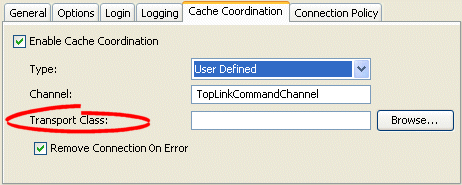107 Configuring a Custom Coordinated Cache
This chapter describes the various components that you must configure to use a custom, user-defined coordinated cache. For more information, see Section 102.3.4, "Custom Coordinated Cache".
This chapter includes the following sections:
Table 107-1 lists the configurable options for a custom, user-defined coordinated cache.
107.1 Introduction to Custom Coordinated Cache Configuration
Table 107-1 lists the configurable options for a custom coordinated cache.
Table 107-1 Configurable Options for a Custom Coordinated Cache
| Option to Configure | Oracle JDeveloper |
TopLink Workbench |
Java |
|---|---|---|---|
|
Cache coordination change propagation at the descriptor level (see Section 119.15, "Configuring Cache Coordination Change Propagation at the Descriptor Level") |
|||
|
Service channel (see Section 103.3, "Configuring a Service Channel") |
|||
|
Transport class (see Section 107.2, "Configuring Transport Class") |
|||
|
Connection handling (see Section 103.10, "Configuring Connection Handling") |
107.2 Configuring Transport Class
To configure a custom coordinated cache, you must specify your custom instance of oracle.toplink.remotecommand.TransportManager.
This section describes How to Configure Transport Class Using TopLink Workbench.
107.2.1 How to Configure Transport Class Using TopLink Workbench
To select the transport class for the user defined coordinated cache, use this procedure:
-
Select a session or session broker in the Navigator. Its properties appear in the Editor.
-
Click the Cache Coordination tab. The Cache Coordination tab appears.
-
Ensure the Enable Cache Coordination option is selected and the Type is User Defined (see Section 102.3, "Cache Coordination").
Figure 107-1 Cache Coordination, Transport Class Option

Description of "Figure 107-1 Cache Coordination, Transport Class Option"
-
Click Browse and select the transport class for the user-defined coordinated cache.
Click Browse and select the transport class for the user-defined coordinated cache.
107.2.2 How to Configure Transport Class Using Java
Create a custom instance of the oracle.toplink.remotecommand.TransportManager that you use as a transport class for your coordinated cache.
You obtain the TransportManager using the following Session API:
Session.getCommandManager().getTransportManager()